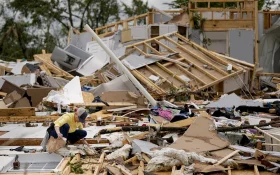Dangerous storms continued to batter parts of the South on Thursday, following a day of severe weather with damaging tornadoes that claimed the lives of at least three people in the region.
A heavy line of storms moved into Atlanta near the end of the morning rush hour, causing delays at busy hub airports in Atlanta and Charlotte, North Carolina. The National Weather Service’s Storm Prediction Center warned of an “enhanced risk” for severe weather spanning from Texas to South Carolina.
These storms are part of a series of torrential rains and tornadoes that have impacted the Plains, Midwest, and now the Southeast throughout the week. The death toll since Monday has risen to at least four. The severe weather comes after an exceptionally stormy April, during which the U.S. experienced 300 confirmed tornadoes, the second-highest number on record for the month and the most since 2011.
As of Thursday, nearly a quarter-million homes and businesses across several Southern states were still without power due to the previous night’s storms, according to PowerOutage.us.
In Tennessee, a tornado damaged homes, injured people, toppled power lines and trees, and claimed the life of a 22-year-old man in a car in Claiborne County, north of Knoxville, as reported by officials. A second person lost their life south of Nashville in Columbia, where officials said a likely tornado blew homes off their foundations.
Columbia resident Bob Booth had just returned home from Georgia and was about to watch television when he heard a “crazy racket.” He described the scene outside as “all hell breaking loose” and mentioned that the top half of one of his trees had fallen across the road. Booth was informed that it would take some time before his power was restored.
He noted that one neighbor was fortunate, as all of their trees were destroyed except for one that would have destroyed their house.
In Spring Hill, not far from Columbia, retired pastor Walter Shell and his wife took their two dogs and sought shelter in the basement when his phone alerted him to a tornado. Shell remarked, “It missed where me and my wife were standing by about about 4 inches. It went around. It pays to pray, I can tell you.”
Northeast of Nashville, torrential rains led to a flash flood emergency and water rescues. The city’s main airport issued a temporary ground stop, and the weather service issued a tornado emergency, its highest alert level, for nearby areas.
Several Tennessee counties closed schools on Thursday. In Georgia, some districts north of Atlanta canceled in-person classes or delayed start times due to storm damage overnight, which included fallen trees on houses and vehicles around Clarkesville. No injuries were reported in the area.
Lynn Smith, director of the Habersham County Emergency Management Agency, said, “We’re just trying to clean up right now and wait for the next round.”
In northern Alabama’s DeKalb County, a strong tornado damaged at least 20 homes and caused injuries but no deaths, according to officials.
In North Carolina, a state of emergency was declared Wednesday night for Gaston County, west of Charlotte, after a storm toppled power lines and trees, including one that landed on a car, killing one person inside and sending another to the hospital.
The storms followed heavy rain, strong winds, hail, and tornadoes that affected parts of the central U.S. on Monday, including a twister that ripped through an Oklahoma town and killed one person. On Tuesday, the Midwest bore the brunt of the severe weather, with tornadoes touching down in parts of Michigan, Ohio, and Indiana.
The Kalamazoo area in Michigan was particularly hard hit, with a FedEx facility being ripped apart and downed power lines trapping about 50 people.
Tornadoes were also confirmed near Pittsburgh, in central Arkansas, and in northern West Virginia. The West Virginia twister was at least the 11th tornado this year in the state, which typically sees an average of two tornadoes per year.
Both the Plains and Midwest have been pummeled by tornadoes this spring, highlighting the ongoing threat of severe weather across the country.
